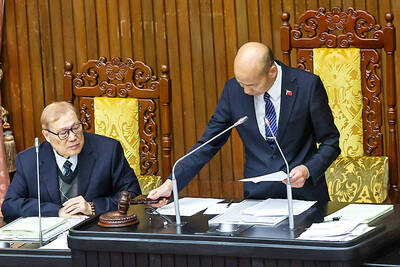Telecoms and Internet service providers (ISPs) that fail to comply with government regulations to block broadcasts from illegal over-the-top (OTT) service operators from China could face a fine of up to NT$5 million (US$1.69 million), according to a draft Internet audiovisual service management act passed by the National Communications Commission (NCC) yesterday.
Details of the draft act are scheduled to be announced next week after the wording of its articles is reviewed by NCC commissioners, it said, adding that the act would be subject to a 60-day public review period afterward.
Regarding Chinese Internet audiovisual service operators that operate in Taiwan illegally without securing permission in accordance with the Act Governing Relations Between the People of the Taiwan Area and the Mainland Area (臺灣地區與大陸地區人民關係條例), the draft act states that Taiwanese telecoms and ISPs should not offer them telecommunication service or equipment, data center services, content delivery network services or cloud services, the commission said.

Photo courtesy of a reader
They should also comply with government regulations to block the broadcast of Chinese operators’ content in the nation, it added.
Industry observers said that the draft act specifically targets Chinese OTT operators iQiyi.com (愛奇藝) and Tencent Video (騰訊視頻), which the Mainland Affairs Council (MAC) had ruled as illegal audiovisual service operators based on the act regulating cross-strait affairs.
Although operating illegally in Taiwan, iQiyi has about 6 million subscribers across the nation, they said.
The nation’s ISPs and other relevant service providers must not help OTT operators transmit content so long as the MAC deems them as contravening the cross-strait act, NCC spokesperson Hsiao Chi-hung (蕭祈宏) said.
Those assisting them in doing so could face a fine of NT$500,000 to NT$5 million, he said.
Meanwhile, the draft act would require OTT operators with large-scale operations or significant market influence to register with the government, which would make public the names of the operators, the commission said.
Operators that fail to register with the government after their names are publicized would be fined between NT$100,000 and NT$1 million, it added.
In addition, OTT operators that have registered with the government would be obligated to regularly report key business information to the NCC, from the number of subscribers they have to their sales revenue, the commission said.
They must join or form an OTT service association and follow the ethical guidelines set by the association, it added.
“The OTT operators must annually disclose the percentages of local content on their platforms that are produced by themselves or through partnerships with local content providers. The Ministry of Culture would determine the subsidies and other incentives available to them based on the disclosed percentages,” the commission said.

DEFENDING DEMOCRACY: Taiwan shares the same values as those that fought in WWII, and nations must unite to halt the expansion of a new authoritarian bloc, Lai said The government yesterday held a commemoration ceremony for Victory in Europe (V-E) Day, joining the rest of the world for the first time to mark the anniversary of the end of World War II in Europe. Taiwan honoring V-E Day signifies “our growing connections with the international community,” President William Lai (賴清德) said at a reception in Taipei on the 80th anniversary of V-E Day. One of the major lessons of World War II is that “authoritarianism and aggression lead only to slaughter, tragedy and greater inequality,” Lai said. Even more importantly, the war also taught people that “those who cherish peace cannot

STEADFAST FRIEND: The bills encourage increased Taiwan-US engagement and address China’s distortion of UN Resolution 2758 to isolate Taiwan internationally The Presidential Office yesterday thanked the US House of Representatives for unanimously passing two Taiwan-related bills highlighting its solid support for Taiwan’s democracy and global participation, and for deepening bilateral relations. One of the bills, the Taiwan Assurance Implementation Act, requires the US Department of State to periodically review its guidelines for engagement with Taiwan, and report to the US Congress on the guidelines and plans to lift self-imposed limitations on US-Taiwan engagement. The other bill is the Taiwan International Solidarity Act, which clarifies that UN Resolution 2758 does not address the issue of the representation of Taiwan or its people in

The Philippines yesterday criticized a “high-risk” maneuver by a Chinese vessel near the disputed Scarborough Shoal (Huangyan Island, 黃岩島) in a rare incident involving warships from the two navies. The Scarborough Shoal — a triangular chain of reefs and rocks in the contested South China Sea — has been a flash point between the countries since China seized it from the Philippines in 2012. Taiwan also claims the shoal. Monday’s encounter took place approximately 11.8 nautical miles (22km) southeast” of the Scarborough Shoal, the Philippine military said, during ongoing US-Philippine military exercises that Beijing has criticized as destabilizing. “The Chinese frigate BN 554 was

LEISURE: The new law adds Confucius’ birthday, the anniversary of the Battle of Guningtou, Constitution Day and Little New Year as national holidays The Legislative Yuan yesterday passed new legislation adding four national holidays and making Workers’ Day a national holiday for all sectors. The Chinese Nationalist Party (KMT) and the Taiwan People’s Party used their combined majority in the legislature to push the jointly proposed draft through its third and final reading. This new law supersedes the existing regulations for the implementation of memorial days and state holidays, which are administered by the Ministry of the Interior. The new law recognizes Confucius’ birthday on Sept. 28, the anniversary of the Battle of Guningtou on Oct. 25, Constitution Day on Dec. 25 and “Little New Year,”